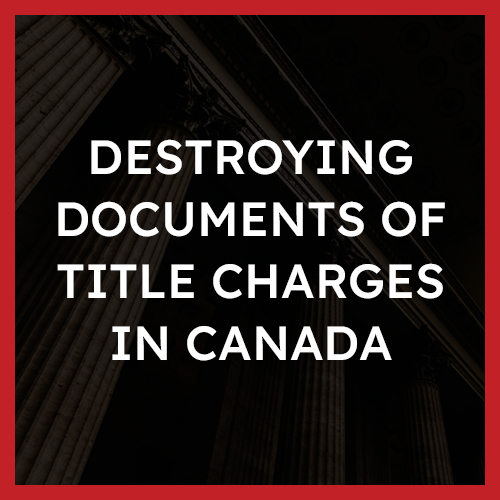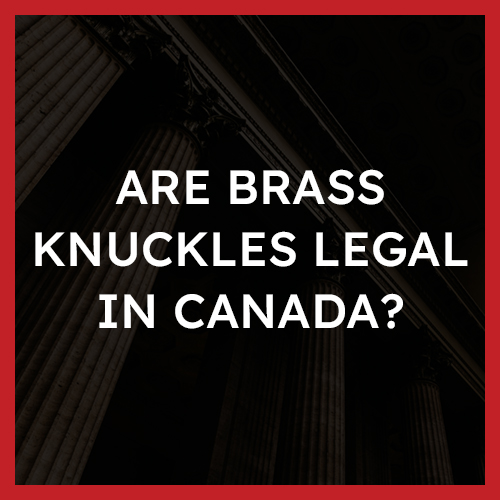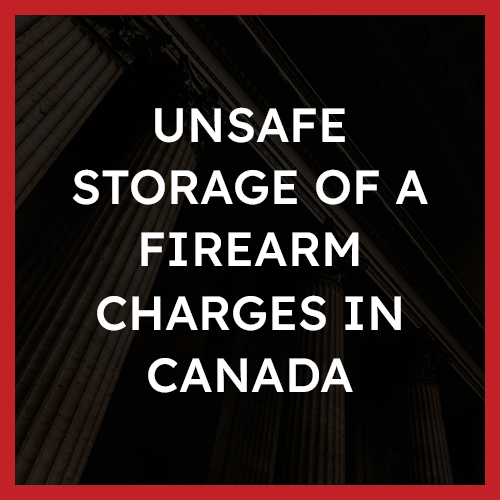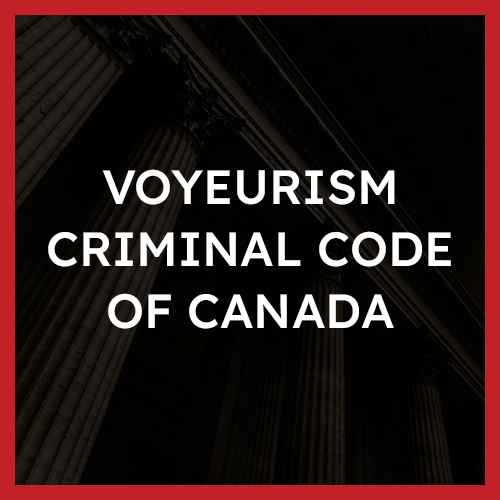Destroying Documents of Title Laws in Canada
What is a Destroying Documents of Title charge?

A destroying document of title charge occurs when a person, for fraudulent purposes, destroys, cancels, conceals or obliterates a document of title to goods or lands, a valuable security or testamentary instrument, or a judicial or official document. Documents that would qualify under this charge include a bill of sale for a home, a bill of lading, and a certificate or order for the delivery of goods. It also includes documents like wills and warrants.
Destroying documents of title is a hybrid offence with a Crown election. This means that depending on the circumstances of your case the Crown can elect to proceed by indictment or summarily. If an accused is prosecuted by indictment, there is a Defence election of court under s. 536(2) of the Criminal Code.
Examples
Some examples of destroying documents of title charge may include:
- A document of title to goods or lands: such as burning documents that are central to proving a person’s ownership of an item;
- A valuable security or testamentary instrument: such as the destroying of a will or a share certificated; and
- A judicial or official document: such as altering or concealing official court documents.
Defences
The defences available to destroying documents of title charge are entirely dependent on the facts of your case.
However, some defences to a destroying documents of title charge may include:
- The accused lacked a fraudulent purpose in carrying out the offence. This may occur in multiple ways including: the accused accidentally misplaced or damaging documents of title, or the accused accidentally concealed documents they did not know they were in possession of; and
- The accused was not the person who destroyed, cancelled, concealed or obliterated the documents of title.
Punishments
A destroying documents of title charge is a hybrid offence, which entails a maximum punishment as follows:
- Imprisonment for a term not exceeding 10 years.
Punishments for destroying documents of title charge depend on if the Crown elects to pursue the charge as an indictable offence or summarily. There are no mandatory minimum penalties for this offence. The maximum is no more than 10 years of incarceration if prosecuted by indictment. If prosecuted summarily, the maximum punishment is no more than 6 months of incarceration and/or a $5,000 fine.
A destroying documents of title charge can also entail severe consequences for current and future employment opportunities and immigration status.
Overview of the Offence
According to s.340 of the Criminal Code:
Destroying documents of title
340 Every person is guilty of an indictable offence and liable to imprisonment for a term of not more than 10 years or is guilty of an offence punishable on summary conviction who, for a fraudulent purpose, destroys, cancels, conceals or obliterates
(a) a document of title to goods or lands,
(b) a valuable security or testamentary instrument, or
(c) a judicial or official document.
Section 2 of the Criminal Code defines:
“document of title to goods” as:
including a bought and sold note, bill of lading, warrant, certificate or order for the delivery or transfer of goods or any other valuable thing, and any other document used in the ordinary course of business as evidence of the possession or control of goods, authorizing or purporting to authorize, by endorsement or by delivery, the person in possession of the document to transfer or receive any goods thereby represented or therein mentioned or referred to;
“document of title to lands” as:
including any writing that is or contains evidence of the title, or any part of the title, to real property or to any interest in real property, and any notarial or registrar’s copy thereof and any duplicate instrument, memorial, certificate or document authorized or required by any law in force in any part of Canada with respect to registration of titles that relates to title to real property or to any interest in real property;
(a) an order, exchequer acquittance or other security that entitles or evidences the title of any person
(i) to a share or interest in a public stock or fund or in any fund of a body corporate, company or society, or
(ii) to a deposit in a financial institution,
(b) any debenture, deed, bond, bill, note, warrant, order or other security for money or for payment of money,
(c) a document of title to lands or goods wherever situated,
(d) a stamp or writing that secures or evidences title to or an interest in a chattel personal, or that evidences delivery of a chattel personal, and
(e) a release, receipt, discharge or other instrument evidencing payment of money.
The Guilty Act (Actus Reus)
The actus reus for destroying documents of title charge under s. 340 is established by proof, beyond a reasonable doubt, of the following:
- The action of destroying, cancelling, concealing or obliterating a document of title to lands or goods, a valuable security, testamentary instrument, or a judicial or official document.
The Guilty Mind (Mens Rea)
The mens rea for a destroying document of title charge under s. 340 include proving, beyond a reasonable doubt, that:
- The action of destroying, cancelling, concealing or obliterating a document of title must be done with a fraudulent purpose. This implies that the accused is aware of the consequences of their actions, meaning that the accused intends to deceive or defraud in carrying out the offence;
- The fraudulent purpose is required by Parliament to avoid criminalizing individuals who unintentionally damage or lose legal documents.
Defences
How to Beat a Destroying Documents of Title Charge
Every case is different. The availability and strength of any defence depend entirely on the specific facts of your case. The strength of any available defence rests on the evidence against you and the precise details of the allegations. However, the following are some common defences that may be used when fighting a destroying documents of title charge:
Factual innocence
A strong defence against a destroying documents of title charge is to maintain that you are factually innocent. If you can show that the facts and the evidence do not support that you did destroy, cancel, conceal or obliterate a document of title, then you may have a defence that you were factually innocent.
Identity
Depending on the circumstances of your case, a possible defence to a destroying documents of title charge may be to raise an identity defence. In this case, for this defence to be raised successfully, you will have to prove that you were not the person who destroyed, cancelled, concealed or obliterated a document of title.
The Documents Were Not Documents of Title as Defined
Depending on the circumstances of your case, a possible defence is that the documents in question do not fit under one of the three categories of documents of title as defined by the Criminal Code.
Any applicable Charter defences
The Charter sets out your rights and freedoms before and after your arrest. If the police fail to abide by these rights deliberately or inadvertently, it could aid in your defence. If any of your Charter rights have been violated before or after your arrest, you may be able to have some or all of the evidence that the Crown is relying on to secure a conviction excluded under s. 24(2) of the Charter.
Punishments
The Criminal Code provides for a possible maximum term of imprisonment of no more than 10 years for those convicted of a destroying documents of title charge.
Persons found guilty of a destroying documents of title charge are eligible for sentencing entailing a discharge, suspended sentence, stand-alone fine, custody, custody with a fine or probation or a conditional sentence order.
Beyond any immediate jail and/or probation sentence you receive, there is also a discretionary DNA Order.
This is authorized as a secondary offence listed under s. 487.04 (c), (d) or (e), and the DNA order can be authorized regardless of if the Crown proceeds summarily or by indictment.
Frequently Asked Questions
What does a destroying documents of title charge mean?
Destroying documents of title is the act of destroying, cancelling, concealing or obliterating a document of title to lands or goods, a valuable security or testamentary instrument, or a judicial or official document. The action must be done with a fraudulent purpose, meaning that the accused committed the act with the intent to defraud or deceive.
Is destroying documents of title an indictable offence?
Destroying documents of title is a hybrid offence. This means that the Crown prosecutor can choose to prosecute someone charged with a destroying documents of title charge either summarily or by indictment. If the Crown chooses to prosecute an accused by indictment, then if the accused is found guilty, they will be charged with an indictable offence.
Can you go to jail for a destroying documents of title charge?
If you destroy documents of title under s. 340 of the Criminal Code, you can go to jail. If the Crown proceeds by indictment, a destroying documents of title charge carries a maximum sentence of no more than ten years in jail. If the Crown proceeds summarily, the maximum jail sentence is two years less a day. Therefore, there is a possibility that you can go to jail for a destroying documents of title charge.
Published Decisions
Gaysek v. R, 1971 CanLII 888 (SCC)
The accused in this case was a principal in a firm contracted with a company to take periodic inventories in its stores and was in charge of this exercise at store No. 20 of the company’s extensive store system. It is alleged that he falsified inventory sheets or records, which were prepared in his writing, respecting the inventory on certain dates carried by that store. The evidence showed that the sums recorded in the particular inventory sheets exceeded those shown on the inventory slips for the same items.
The accused was charged with fraud and forgery, however, the Supreme Court commented on s. 340 of the Criminal Code as the accused argued that this section makes it an offence to make a false entry in a document with intent to defraud and that if full effect were given there would be duplication between the offences of fraud, forgery and destroying documents of title. The court acknowledged that duplication might be so but held that the issue did not arise in the present case and left that question to Parliament, rather than the courts.
Since this case, Parliament amended the Criminal Code in 2019 to make the offence hybrid, and defined the documents referred to in the provision. While it is clear that s. 340 of the Criminal Code criminalizes the destruction, cancellation, concealment, or obliteration of certain types of documents for fraudulent purposes, the courts are yet to comment on the similarities of the provision to other property offences, including fraud and forgery.
You can read the full decision here.
Contact Us
If you have been charged with a criminal offence, visit our location pages to contact our team.
About The Author
Ask A Question
We endeavor to respond to questions within 24 hours. If your matter is urgent, please call our office or submit a request for a free consultation.







